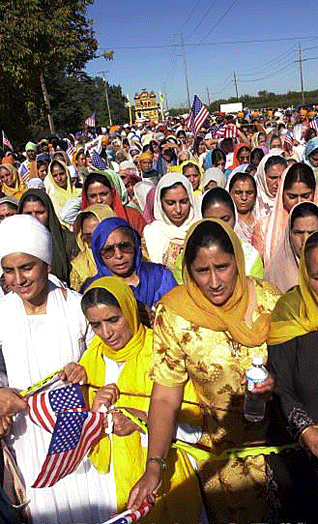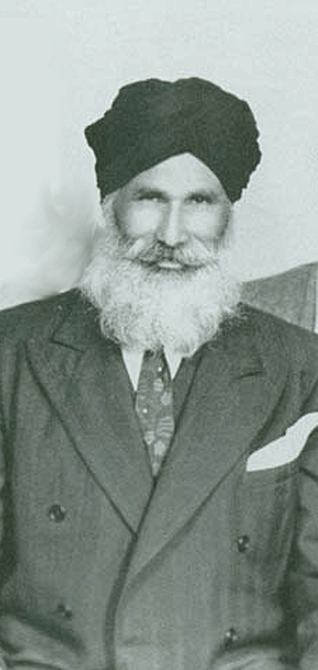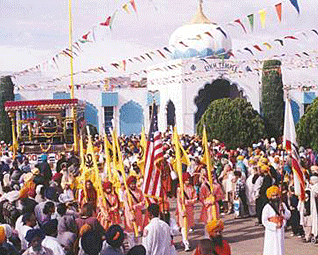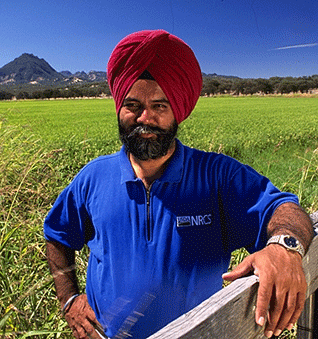History
70,000 Celebrate Sikh-American Pioneers
by SUKHJIT KAUR PUREWAL
As much as it is a celebration of the Sikh faith and culture, the annual Sikh Parade in Yuba City, California, U.S.A. is also an occasion to take a glimpse at the achievements of early Sikh pioneers.
They came to plow the lands of California, seize the American dream and lay the foundation for what is today one of the most successful minority communities in the nation.
Now in its twenty-eighth year, the three-day gathering, which revolves around the recitation of the Sikh holy scriptures (the Guru Granth Sahib), is expected to draw upwards of seventy thousand people to the Yuba City Gurdwara on Tierra Buena Road. As is customary, the gurdwara will serve langar (complimentary meals) to all visitors.
To make that possible, volunteers have been busy for days with food preparation. Thousands of pounds of vegetables and thousands of gallons of tea will be consumed during the weekend.
Prayer services begin at 9 a.m. on the first day, and a fireworks show will fill the sky above the gurdwara at night.
Over the weekend, vendors will assemble in the gurdwara parking lot to offer everything from clothing to paintings. More complimentary meals and snacks will be provided by vendors outdoors.
The weekend culminates Sunday with the four-and-a-half mile parade, or "Nagar Kirtan", which literally translates as "town chanting". The route goes south on Tierra Buena Road from the complex, east on Butte House Road, south on Civic Center Boulevard, west on Poole Boulevard, north on Tharp Road, west on to Butte House and north on Tierra Buena back to the site.
The occasion marks the time when the Sikh people received the scriptures as the lasting word on Sikhism, from their tenth and final living guru, Guru Gobind Singh.
Siri Pritam Kaur Khalsa of Yuba City is one of an estimated twenty-five million Sikhs worldwide. Siri Pritam Kaur, who owns Sierra Injury and Sports Rehab Inc., was raised a Catholic, but adopted the Sikh faith about thirty years ago.
"The Guru Granth (Sikh Scripture) is a source of wisdom", she said. On Saturday afternoon, the gurdwara will host an open house and educational seminar.
Scheduled speakers include Harkirit Singh Hansra, the seventeen-year-old author of Liberty at Stake: Sikhs: The Most Visible, Yet Misunderstood, Minority of America, and Bruce La Brack, a professor of anthropology and international studies at the University of the Pacific in Stockton. La Brack is an expert on Sikhism and the evolution of Sikh culture in America.
"Sikhs are among the highest-achieving professionals among all the sub groups", La Brack said in a telephone interview.
It helped that their arrival in the United States in the early 1900s predated that of significant numbers of other South Asians, though it is still recent, in terms of other minority groups.
Unlike Hindus, who believed they'd lose their faith by crossing the ocean, Sikhs had no such fears, La Brack explained.
"Sikhism is quite different from other religions in South Asia - it is not fatalistic", La Brack said. "It is very much about working hard and being self-sufficient; there are very few restrictions".
That is why large numbers of Sikhs have been a mainstay in the Indian army, dating back to the British rule of India and why they settled in foreign lands where they were stationed, including Canada, Great Britain, East Africa, South East Asia, Australia, New Zealand and the Fiji Islands.
And though a Sikh may have taken up arms as a soldier, he never lost his agricultural roots, La Brack said.
"They looked around at Canada, with all of its trees and agriculture, and thought this looked like a cool place", La Brack said.
Others followed. But some men found Canada too cold and eventually made their way down to California, including the Yuba-Sutter area. And when Canada clamped down with immigration laws, Sikhs landed directly in San Francisco.
Men borrowed money and families mortgaged their land to pay for the passage. Some worked in the fields, others on railroad construction and still others in the lumber mills.
It helped, too, that the relatively mild climate and warm summers reminded the men of home.
It was a lonely existence, as xenophobic immigration laws made it impossible for South Asians to send home for wives or other family members.
So, some Sikh men married Mexican women, whose skin tone most closely resembled them.
"The community was very strong, but religion was on a very individual level", La Brack said. "There were few gurdwaras and no granthis; most of the people weren't literate in the language of the Guru Granth".
Despite the limitations, the Stockton Gurdwara Sahib opened in 1912, the first in the United States.
Passage of the Immigration Act in 1965 opened the way for more Asians, including Sikhs, to come to the United States.
Finally, in 1969, the growing Sikh population here in the Yuba-Sutter area opened its first gurdwara, the site of this weekend's festivities.
[Courtesy: Appeal-Democrat]
November 2, 2007
Conversation about this article
1: I.J. Singh (New York, U.S.A.), November 03, 2007, 7:56 PM.
Informative and wonderful window on our early history. I always thought the first gurdwara in Stockton dates from 1906. Was I misinformed and is the date 1912 mentioned in this article right? Perhaps other more informed readers will enlighten us. Our history is so poorly recorded and we need to preserve it better.
2: Satvir Kaur (Boston, U.S.A.), November 06, 2007, 10:53 AM.
I'd love to attend the Yuba City Parade sometime.






